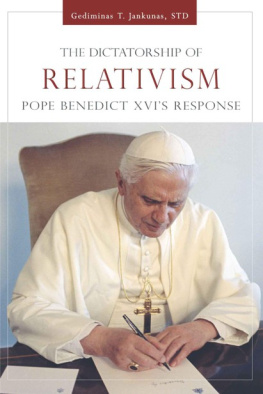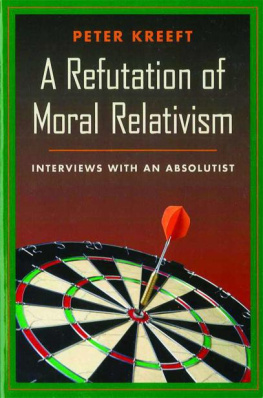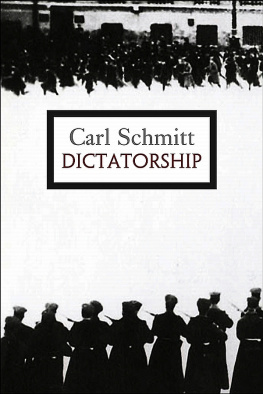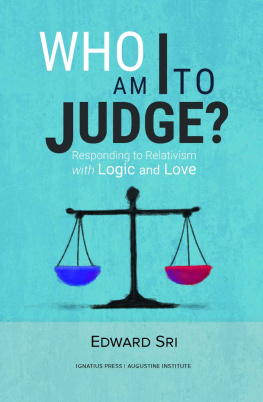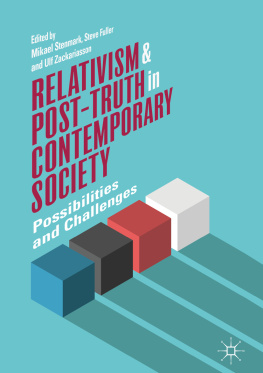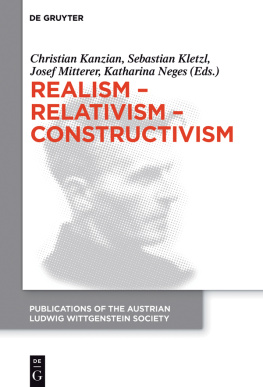Chris Stefanick - Absolute Relativism: The New Dictatorship and What to Do about It
Here you can read online Chris Stefanick - Absolute Relativism: The New Dictatorship and What to Do about It full text of the book (entire story) in english for free. Download pdf and epub, get meaning, cover and reviews about this ebook. year: 0, genre: Religion. Description of the work, (preface) as well as reviews are available. Best literature library LitArk.com created for fans of good reading and offers a wide selection of genres:
Romance novel
Science fiction
Adventure
Detective
Science
History
Home and family
Prose
Art
Politics
Computer
Non-fiction
Religion
Business
Children
Humor
Choose a favorite category and find really read worthwhile books. Enjoy immersion in the world of imagination, feel the emotions of the characters or learn something new for yourself, make an fascinating discovery.

- Book:Absolute Relativism: The New Dictatorship and What to Do about It
- Author:
- Genre:
- Year:0
- Rating:4 / 5
- Favourites:Add to favourites
- Your mark:
- 80
- 1
- 2
- 3
- 4
- 5
Absolute Relativism: The New Dictatorship and What to Do about It: summary, description and annotation
We offer to read an annotation, description, summary or preface (depends on what the author of the book "Absolute Relativism: The New Dictatorship and What to Do about It" wrote himself). If you haven't found the necessary information about the book — write in the comments, we will try to find it.
Chris Stefanick: author's other books
Who wrote Absolute Relativism: The New Dictatorship and What to Do about It? Find out the surname, the name of the author of the book and a list of all author's works by series.
Absolute Relativism: The New Dictatorship and What to Do about It — read online for free the complete book (whole text) full work
Below is the text of the book, divided by pages. System saving the place of the last page read, allows you to conveniently read the book "Absolute Relativism: The New Dictatorship and What to Do about It" online for free, without having to search again every time where you left off. Put a bookmark, and you can go to the page where you finished reading at any time.
Font size:
Interval:
Bookmark:

A bsolute R elativism
The New Dictatorship and What to Do about It
Chris Stefanick
C ATHOLIC
A NSWERS
PRESS
San Diego
2011
Absolute Relativism
Chris Stefanick
2011 by Catholic Answers, Inc.
15 14 13 12 2 3 4 5 6
All rights reserved. Except for quotations, no part of this book may be reproduced or transmitted in any form or by any means, electronic or mechanical, including photocopying, recording, uploading to the Internet, or by any information storage and retrieval system, without written permission from the publisher.
Published by Catholic Answers, Inc.
2020 Gillespie Way
El Cajon, California 92020
1-888-291-8000 orders
619-387-0042 fax
catholic.com
Cover by Devin Schadt
Interior design by Russell Design
ISBN 978-1-938983-17-7
For my wife, Natalie, whose life is a pursuit of Beauty and Truth. Without you I could do none of what I do and Id be half the man I am.
Foreword
In his 2010 Christmas address to the College of Cardinals, the Roman Curia, and the Governorate of Vatican City State, Pope Benedict XVI spoke clearly and strongly about the profoundly disordered moral state in which our world finds itself. Speaking about the grave evils of our timefor example, the sexual abuse of minors by the clergy, the marketing of child pornography, sexual tourism, and the deadly abuse of drugshe observed that they are all signs of the tyranny of mammon which perverts mankind and that they result from a fatal misunderstanding of freedom which actually undermines mans freedom and ultimately destroys it.
His words are redolent of the powerful pastoral concern that he expressed in his homily during the Mass for the Election of the Roman Pontiff, celebrated before the conclave during which he was elected to the See of Peter. He spoke of how the the thought of many Christians has been tossed about, in our time, by various ideological currents, observing that we are witnesses to the human deception and the trickery that strives to entice people into error, about which St. Paul wrote in his Letter to the Ephesians. He noted that, in our time, those who live according to a clear faith based on the Creed of the Church are viewed as extremists, while relativismthat is, letting oneself be tossed here and there, carried about by every wind of doctrineis extolled. Regarding the source of the grave moral evils of our time, he concluded: We are building a dictatorship of relativism that does not recognize anything as definitive and whose ultimate goal consists solely of ones own ego and desires.
Reflecting once again, in his 2010 Christmas address, on the grave evils that are destroying us as individuals and as a society and have left us with a culture marked by violence and death, the Holy Father reminded us that, if we, with the help of Gods grace, are to overcome these grave evils, we must turn our attention to their ideological foundations. He then identified directly and unequivocally the ideology that fosters these evils: a perversion of ethos , the norm of life or moral norm, which has even entered into the thinking of some theologians in the Church.
Referring to one of the more shocking manifestations of the ideologynamely, the so-called moral position that the sexual abuse of children by adults is actually good for the children and for the adultshe declared:
It was maintainedeven within the realm of Catholic theologythat there is no such thing as evil in itself or good in itself. There is only a better than and a worse than. Nothing is good or bad in itself. Everything depends on the circumstances and on the end in view. Anything can be good or also bad, depending upon purposes and circumstances. Morality is replaced by a calculus of consequences, and in the process it ceases to exist.
Pope Benedict XVI describes a moral relativismcalled proportionalism or consequentialism in contemporary moral theologythat has generated profound confusion and outright error regarding the most fundamental truths of the moral law. It has led to a situation in which morality itself ceases to exist.
One thinks, for instance, of the plague of procured abortion in our society, which justifies the wholesale murder of the unborn in the womb as the exercise of the so-called right of the mother to choose whether to bring to term the baby she has conceived; of the artificial generation of human life and its destruction at the embryonic stage of development, which are justified as the means to find cures for crippling or deadly diseases; and of the so-called mercy killing of those who have the first title to our careour brothers and sisters who have grown weak through advanced years, grave illness, or special needswhich is justified as care for the quality of their lives. One also thinks of the ever-advancing agenda of those who want to redefine marriage to include the unnatural sexual union of two persons of the same sex, which is justified as tolerance of so-called alternative forms of human sexuality, as if there were a true form of human sexuality other than that intended by God, our Creator and Redeemer.
To confront the ideology, Pope Benedict XVI has urged us to study anew the teaching of his predecessor, the Venerable (soon to be Blessed) Pope John Paul II, in his encyclical letter Veritatis Splendor , On the Fundamentals of the Churchs Moral Teaching, in which he, in the words of Pope Benedict XVI, indicated with prophetic force, in the great rational tradition of Christian ethos, the essential and permanent foundations of moral action. Reminding us of the need to form our consciences in accord with the moral teaching of the Church, our Holy Father also reminds us of our responsibility to make these criteria audible and intelligible once more for people today as paths of true humanity, in the context of our paramount concern for mankind. In the exhortation of Pope Benedict XVI, we see the expression of the deepest pastoral charity of the Vicar of Christ on earth: charity, which like that of the Christ the Good Shepherd, knows no boundary and is unceasing.
The book that you now hold in your hands is precisely a tool by which to respond to Pope Benedict XVIs exhortation that we must address the ideology that underlies so many and grave evils in our time. Through his writing, Christopher Stefanickdrawing upon his studies of the Churchs moral teaching and his many years of working with the pastors of the Church, especially in their care of youthhelps us to reflect more deeply on the concept of ethos , the moral norm, and its relationship to the unchanging truth about God, ourselves, and our world. Our author leads us to an ever deeper reflection upon our own moral thinking and its coherence with the moral truth that our Lord Jesus Christ teaches us in the Church. In a particular and most important way, he helps us to address a false notion of tolerance, which is nothing less than an expression of the dictatorship of relativism, which threatens to destroy us and our society and through which morality ceases to exist.
In the end, as our author reminds us, we discover the truth, the true concept of ethos , in Jesus Christ in a personal relationship with him as he comes to meet us and to make us ever more one with him in his Mystical Body, the Church. In Jesus Christ, God the Son made man, heaven has come to earth to dispel the darkness of error and sin and to fill our souls with the light of truth and goodness. If we live in Christ, in the union of our hearts with his Sacred Heart, to use the words of our author, when people who are choking on the fumes of relativism come near [us], they should get a whiff of the rarified air of heaven and a glimpse into a world that makes sense. Living in Jesus Christ, living in accord with the truth that he alone teaches us in his Church, we become light to dispel the confusion and error that lead to so many and grave moral evils of our time and to inspire a life lived in accord with the truth and, therefore, marked by freedom and joy.
Font size:
Interval:
Bookmark:
Similar books «Absolute Relativism: The New Dictatorship and What to Do about It»
Look at similar books to Absolute Relativism: The New Dictatorship and What to Do about It. We have selected literature similar in name and meaning in the hope of providing readers with more options to find new, interesting, not yet read works.
Discussion, reviews of the book Absolute Relativism: The New Dictatorship and What to Do about It and just readers' own opinions. Leave your comments, write what you think about the work, its meaning or the main characters. Specify what exactly you liked and what you didn't like, and why you think so.


